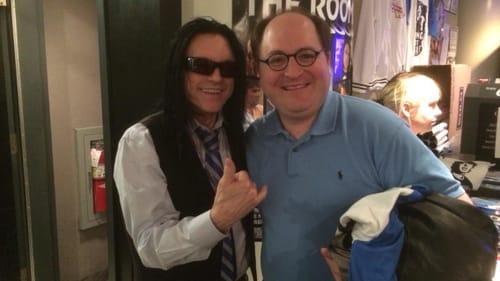Stay in the Loop
BSR publishes on a weekly schedule, with an email newsletter every Wednesday and Thursday morning. There’s no paywall, and subscribing is always free.
Philly’s big-screen problem continues
Escalators, art films, and Tommy Wiseau: Farewell to Ritz at the Bourse

When I remember the Ritz at the Bourse, I'll always think of the long staircase first.
Every other major movie theater in the Philadelphia area is located at street level, or perhaps a few floors above it. But at the Bourse, while its corner box office was right on 4th Street, the theater itself was at the bottom of a long staircase, leading to the world of cinematic offerings below. (Alas, you couldn’t ride down, since the theater's down escalator has been out of order for at least a few years.)
The descent not only made cellphone reception unreliable—a good thing, most cinephiles would say—but also created a nice subterranean vibe, like watching a movie in a strange basement, one with popcorn and vintage movie posters.
Terrible news
The Ritz at the Bourse, which parent company Cohen Media Group announced last week would close for good on January 26, didn’t feature state-of-the-art technology or huge screens or comfortable seats or even two working escalators. What it did offer was a fun and unique environment for experiencing many films that couldn't be found on a big screen anywhere else in town. Its closure is terrible news for anyone in Philadelphia who cares about the movies.
In addition to frequent press and preview screenings, the Bourse was the local home of midnight movies, including the recently resurgent Rocky Horror Picture Show, and The Room, with the theater occasionally hosting appearances by the latter cult film's eccentric filmmaker, Tommy Wiseau (if you know The Room, you'll appreciate the irony of the movie screening across the street from a store called Lisa's Flowers and Gifts). The Bourse also regularly hosted one-off screenings of classics, with the likes of Akira, American Psycho, The Life Aquatic With Steve Zissou, Blade Runner, and the restored version of The Cotton Club all appearing in recent months.
What will we miss?
In the past two years, as Netflix has given brief theatrical releases to its Oscar-contending films, the Bourse was the only place within the city limits where you could catch Roma, The Irishman, Marriage Story, and other Netflix movies on the big screen. But most of all, the Bourse was the only place in town to exhibit certain indie and foreign-language films of a more esoteric nature than the stuff that shows even at the Ritz East and Five. Pain & Glory, The Kingmaker, Recorder: The Marion Stokes Project, and other standout movies from last year had their engagements there, and if there was a great 2019 film for which you never once saw a TV commercial, it was probably a Bourse movie.

A source at Landmark tells me that the "Calendar" events, which include the repertory screenings and midnight movies, will move over to Ritz East, which is good news. But it's simple math: subtracting the Bourse's five screens leaves significantly less real estate for indie, documentary, and foreign-language films in a city that already has far fewer screens than it ought to. In 2019 there were a handful of films of note that received no Philadelphia release at all. Minus the Bourse, I suspect that list will be a bit longer in 2020.
What’s left?
So where to go? The Lightbox Film Center, recently shuttered in University City, is reopening in February, in its new location at University of Arts, but that's merely a lateral move. PhilaMOCA is supposed to reopen soon as well, in Callowhill, but that's only very occasionally a film venue. The Philadelphia Film Center, formerly the Prince, has two screens with more to come, and is committed to showing retrospectives.
When the new AMC Dine-In Theater opened at the Fashion District last year, it ended a Center City multiplex drought of nearly 20 years, but that theater, at least so far, doesn't show indie or repertory fare. There are several theaters outside the city, including the Bryn Mawr Film Institute, the Ambler Theatre, and the Colonial Theater in Phoenixville, offering that combination of indie and classic titles.

But when it comes to the city, the Bourse's closure restates the need for one of the major cinephile chains to make a move into Philadelphia. I’d really love to see either Alamo Drafthouse or ArcLight arrive in our market, as both chains are committed to indie and repertory film, as well as proper projection and general film appreciation. While Alamo Drafthouse is based in Texas and ArcLight in Los Angeles, both have been moving into the northeast in recent years, with Alamo now firmly established in New York and ArcLight recently opening a new theater in Boston.
Philly wants high-quality cinema
Philadelphia's had a big-screen problem for a while now, and I've been writing about it in BSR for several years. Over the past year, it's often been one step forward (the AMC Theater and expanded Film Center) and two steps back (the closing of the original Lightbox, and now the Bourse). I realize the economics of building and sustaining movie theaters in a city are tough, but it's very clear that there's demand in our city for high-quality cinema.
I wish a fond farewell to the Bourse, the place where I saw some of my favorite movies of the past 15 years, argued about them in the lobby, and even met Tommy Wiseau.
Sign up for our newsletter
All of the week's new articles, all in one place. Sign up for the free weekly BSR newsletters, and don't miss a conversation.

 Stephen Silver
Stephen Silver